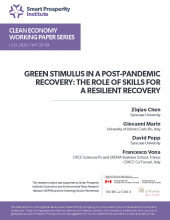As nations struggle to restart their economy after COVID-19 lockdowns, calls to include green investments in a pandemic-related stimulus are growing. Yet little research provides evidence of the effectiveness of a green stimulus. We do know that investments put forward in response to the pandemic must be designed for the world to come, which includes the need to respond to the climate crisis.
This working paper begins by summarizing recent research on the effectiveness of the green portion of the 2009 American Recovery and Reinvestment Act on employment growth. Green investments are most effective in communities whose workers have the appropriate “green” skills.
This paper then provides new evidence on the skills requirements of both green and brown occupations, as well as from occupations at risk of job losses due to COVID-19, to illustrate which workers are most likely to benefit from a pandemic-related green stimulus. The analysis finds similarities between some energy sector workers and green jobs, but a poor match between green jobs and occupations at risk due to COVID-19.
Finally, it provides suggestive evidence on the potential for job training programs to help ease the transition to a green economy.
Green Stimulus in a Post-Pandemic Recovery illuminates where green stimulus investments work and articulates how the long run benefits of a green stimulus are real. It explores policy implications and provides guidance as to how green investments can be used effectively as part of a pandemic-related stimulus package that helps to reshape the economy.
The Clean Economy Working Paper Series disseminates findings of ongoing environmental and clean economy work conducted by researchers from a range of disciplines. These working papers are meant to make results of relevant scholarly work available in a preliminary form. Although these papers have not undergone a peer-review process, they meet general standards of scholarly excellence. The views expressed in these working papers are those of the authors and do not necessarily reflect the opinions of Smart Prosperity Institute.




